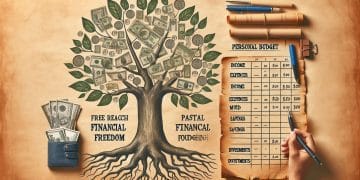Master Your Finances: Unlock the Power of Personal Budgeting


Introduction
On the path to financial autonomy, mastering personal budgeting becomes indispensable. A strategic budget unravels a clear view of your financial state, enabling informed choices and curtailing unnecessary expenses while paving the way for future investments. Despite its critical role, many perceive budgeting as daunting or limiting. This article seeks to simplify personal budgeting, transforming complexity into an accessible journey for everyone.
Anúncios
For novices venturing into budgeting or seasoned individuals refining their skills, this guide equips you with essential tools for financial freedom. Personal budgeting serves as a cornerstone of financial literacy, empowering individuals to plan expenditures, prioritize financial goals, and secure savings for both short and long-term aspirations. Without a solid budget, financial management can slip, leading to debt and stress.
Beyond tracking expenses and income, a budget is a lens to identify spending patterns and opportunities for saving. A well-structured budget can alleviate financial pressures, ensure stability, and foster a more organized financial life. By understanding personal budgeting intricacies, anyone can gain clarity over their finances, ensuring a balanced and prosperous financial future.
Personal Budgeting Overview
To embark on personal budgeting, one must first comprehend income and expenses. Begin by documenting all income sources such as salaries, bonuses, and side ventures. Similarly, catalog all expenses, from fixed costs like rent to variable ones such as dining or entertainment. Using tools like budgeting apps simplifies the process, offering digital solutions to monitor financial activity over time.
Before diving into numeric details, understanding the motivation behind budgeting is key. Establish clear, achievable financial goals to give your budgeting purpose. These could involve saving for a home, settling student debts, or creating an emergency fund. Defining goals helps prioritize spending and savings, providing clear direction and motivation.
Armed with knowledge of income, expenses, and goals, constructing a realistic budget plan becomes feasible. Begin by categorizing expenses into essential needs and discretionary wants. Needs encompass housing, utilities, groceries, and healthcare, while wants include luxuries. Aim to cover all needs and balance desires without compromising goals.
A popular budgeting framework is the 50/30/20 rule, directing 50% of income to necessities, 30% to desires, and 20% to savings or debt repayment. Budgeting is an evolving journey, requiring regular reviews. Compare actual and planned expenditures, identifying overspending and areas for adjustment. Be ready to adapt as financial circumstances shift.
Watch for common budgeting pitfalls, such as underestimating or overlooking irregular expenses like car maintenance or annual subscriptions. These can disrupt if unanticipated. To avoid, scrutinize past outlays to spot potential irregular costs. Also, avoid excessive rigidity in budgeting, which can lead to frustration or failure.
Features of Personal Budgeting
- Understanding income and expenses
- Setting clear financial goals
- Creating a realistic budgeting plan
- Monitoring and adjusting regularly
- Avoiding common budgeting pitfalls
Benefits of Personal Budgeting
Budgeting extends beyond financial tracking, promoting responsible financial behavior and ensuring informed decisions. It encourages saving, reducing the risk of financial shortfalls and debt. Additionally, budgeting fosters financial independence, providing monetary control and stability. By engaging in budgeting, individuals can secure a financially sound future.
Budgeting cultivates discipline and financial awareness, making individuals more mindful of spending and saving habits, leading to improved economic health. An essential advantage is budgeting’s role in stress reduction, offering a blueprint for managing finances effectively, minimizing anxiety associated with money management.
The process of budgeting enhances goal-setting skills, enabling individuals to outline and achieve financial objectives systematically. It leads to better financial literacy, as individuals gain insight into financial concepts and the importance of balancing costs and savings. Ultimately, budgeting offers a roadmap to realize financial freedom, guiding users towards lifelong financial stability.
Establishing and adhering to a budget helps in recognizing and adapting to changes in financial situations, safeguarding against unforeseen expenditures. Moreover, budgeting equips individuals to allocate resources wisely, ensuring both present needs and future aspirations are met without undue compromise.
Automating savings by setting up fund transfers from income to savings ensures a disciplined routine, safeguarding against unplanned spending. Budgeting also leverages technology through apps to categorize spending, alert users to limits, and offer visual representations, thus simplifying and enhancing financial management.
Regular budgeting habits solidify good financial practices, reinforcing the value of awareness and strategic planning. By reviewing and reflecting on budgeting progress, individuals reinforce positive habits and ensure continuous improvement and alignment with evolving financial goals.
In conclusion, successful budgeting entails understanding income and expenses, setting financial objectives, and creating a flexible but structured plan. This lays the groundwork for informed financial decisions. Avoiding pitfalls and employing tools and strategies significantly boosts budgeting efficacy.
Remember, budgeting is a journey, demanding consistent application of key principles. Embracing patience and persistence will transform your financial perspective, enabling financial freedom and peace of mind.
- Enables smarter financial choices
- Encourages saving and reduces debt
- Promotes financial independence
- Reduces financial stress
- Enhances goal-setting skills





